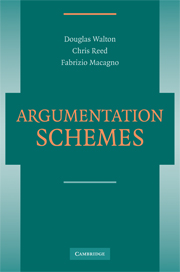Book contents
- Frontmatter
- Contents
- Acknowledgments
- Introduction
- 1 Basic Tools in the State of the Art
- 2 Schemes for Argument from Analogy, Classification, and Precedent
- 3 Knowledge-Related, Practical, and Other Schemes
- 4 Arguments from Generally Accepted Opinions, Commitment, and Character
- 5 Causal Argumentation Schemes
- 6 Schemes and Enthymemes
- 7 Attack, Rebuttal, and Refutation
- 8 The History of Schemes
- 9 A User's Compendium of Schemes
- 10 Refining the Classification of Schemes
- 11 Formalizing Schemes
- 12 Schemes in Computer Systems
- Bibliography
- Index
- References
9 - A User's Compendium of Schemes
Published online by Cambridge University Press: 05 June 2012
- Frontmatter
- Contents
- Acknowledgments
- Introduction
- 1 Basic Tools in the State of the Art
- 2 Schemes for Argument from Analogy, Classification, and Precedent
- 3 Knowledge-Related, Practical, and Other Schemes
- 4 Arguments from Generally Accepted Opinions, Commitment, and Character
- 5 Causal Argumentation Schemes
- 6 Schemes and Enthymemes
- 7 Attack, Rebuttal, and Refutation
- 8 The History of Schemes
- 9 A User's Compendium of Schemes
- 10 Refining the Classification of Schemes
- 11 Formalizing Schemes
- 12 Schemes in Computer Systems
- Bibliography
- Index
- References
Summary
In this chapter a compendium of all the schemes discussed is given, along with the source of the scheme in the argumentation literature. We have tried to make the compendium most useful to the reader by presenting the schemes that represent the most commonly used forms of argument, including not only those used in everyday discourse, but also certain schemes that are important in legal and scientific reasoning. Many of these schemes have subtypes, and research on the classification of the subtypes, and even more generally, research on determining which schemes are subspecies of other schemes, is not yet at an advanced stage. Thus while we have made occasional remarks on these matters, hoping to provide some insight, we have not generally listed all the known subspecies of the schemes. There are two especially important exceptions that need to be noted.
We have included a fairly comprehensive account of the known subschemes of the argument from popular opinion, to give the reader an idea of how it can be important to recognize many of these different subschemes in dealing with common arguments of the type associated with informal fallacies. The other important exception is the case of the argumentum ad hominem. Many subschemes for this type of argument have been recognized, and much work on trying to organize and classify them has been conducted (Walton, 1998).
- Type
- Chapter
- Information
- Argumentation Schemes , pp. 308 - 346Publisher: Cambridge University PressPrint publication year: 2008



